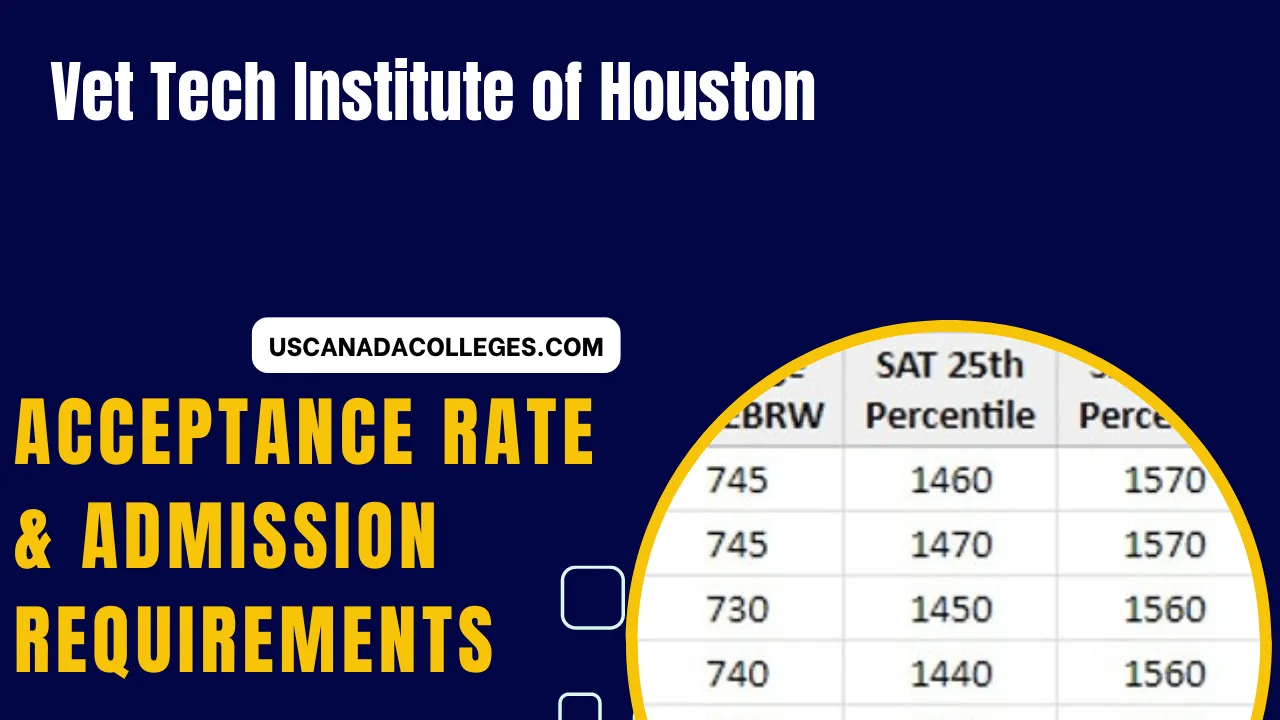Vet Tech Institute of Houston is somewhat selective in its admission process. The acceptance rate of Vet Tech Institute of Houston (Bradford School) is 68.57%. This means that 69 out of every 100 applicants get admitted.
How Competitive are Vet Tech Institute of Houston Admissions?
- Competitive: Applicants need good academics and extracurriculars.
- GPA, SAT/ACT, and AP/IB courses significantly impact admission chances.
- A holistic review considers essays, recommendations, and leadership roles.

To secure admission, you must convince the admission staff that you are both mentally and physically fit for the course of study. More importantly, your GPA, class performance, SAT/ACT scores, and IB or AP courses can help your application stand out. Additionally, if you do not perform well in one area, you can showcase your strengths in other areas, as the Bradford School is not very strict in its admission process, so improving other areas will help you secure admission.
As the acceptance rate is above 50%, you still have a chance if your GPA is not excellent. You can make up for a lower GPA by scoring high on the SAT, and ACT, and taking IB or AP courses.
Additionally, a well-written letter of recommendation, your participation in co-curricular and extracurricular activities, and your interpersonal communication skills can enhance your admission chances.
Vet Tech Institute of Houston Admission Requirements
Can I Get Into Bradford School Without SAT Or ACT?: Vet Tech Institute of Houston does not require admission test scores (SAT/ACT) during the application process and does not recommend that students provide these scores. But it is better to submit the test score if you have performed well in the test. It gives an extra opportunity to showcase your skills and competencies and hence will improve your chances of admission. Check the schedule of the test and plan accordingly. It is advisable to appear multiple times in the test unless you score well above the average SAT / ACT score of the admitted students, as given below. Normally, students may appear in the test 4 to 5 times to improve their scores. But if your score is not up to the mark and is less than the national or state average, then it is better not to submit the score as it will impact negatively.
Vet Tech Institute of Houston (Bradford School) SAT Requirements
Each school has different requirements for SAT and ACT testing. Only a few schools require the SAT or ACT, but many consider your scores if you choose to submit them. The test score policy is already mentioned.
Bradford School Profile
Name: Vet Tech Institute of Houston (Bradford School)
Accredited by: Accrediting Commission of Career Schools and Colleges (ACCSC)
How much does a degree from Bradford School Cost?
The average annual cost of the degree at Vet Tech Institute of Houston is USD: 19550. As most of the students receive Pell Grants and Federal Grants the average annual net price a student has to pay at Vet Tech Institute of Houston is much less than this.
How can I get a scholarship?
56.82% of the students are receiving Pell Grant and 77.73 percent are receiving Federal Grants. So it is a better choice to go to Bradford School and apply for PELL or federal loan grants.
At Vet Tech Institute of Houston, you will have no problem receiving any scholarship from the federal government. Fill in the FAFSA application form at the earliest and enlist Bradford School as your choice in the form.
How much a Bradford School Graduate make?
The average annual salary of the Bradford School graduate after 4-6 years of graduation is USD 35765. An average Bradford School graduate makes this much after 10 years of enrollment (4-6 years after graduation).
The average annual income of a graduate in the United States is USD: 40595
Degree Programs
Associate Degree Programs
Frequently Asked Questions About Vet Tech Institute of Houston Admissions
Answer: Graduates of this university typically earn a lower salary, $35765 annually, especially in non-technical fields.
Question: What is the tuition fee for Vet Tech Institute of Houston?
Answer: The tuition fee at this university is relatively low, around $19550 per year, making it more affordable for many students.
Question: What are my chances of getting a scholarship at Vet Tech Institute of Houston?
Answer: Your chances of getting a scholarship are excellent, with more than a 80% chance, depending on your academic performance and extracurricular involvement.
Question: What is the acceptance rate for Vet Tech Institute of Houston?
Answer: The acceptance rate of Vet Tech Institute of Houston is 68.57 which is relatively high, above 20%, making it somewhat easier to gain admission compared to other top-tier universities.
Question: Is it possible to transfer to Vet Tech Institute of Houston from another university?
Answer: Yes, many students successfully transfer to Vet Tech Institute of Houston each year. Be prepared with your academic transcripts, recommendation letters, and a solid personal statement to make your application competitive.
Question: What is the campus culture like at Vet Tech Institute of Houston?
Answer: The campus culture at Vet Tech Institute of Houston is diverse and vibrant, with numerous student organizations, sports teams, and cultural activities. It’s an ideal environment for personal growth and building lifelong connections.
Question: How can I improve my chances of getting into Vet Tech Institute of Houston?
Answer: To improve your chances, focus on excelling academically, building a strong extracurricular profile, and submitting standout essays. High SAT/ACT scores are also crucial for competitive admissions.
Full list of All degree programs offered by Vet Tech Institute of Houston.
Data on this page is sourced from IPEDS, College Scorecard's latest data as provided in 2024, US Department of Education's latest 2024 statistics, Institute's official websites and printed material as well as additional publicly available sources.
